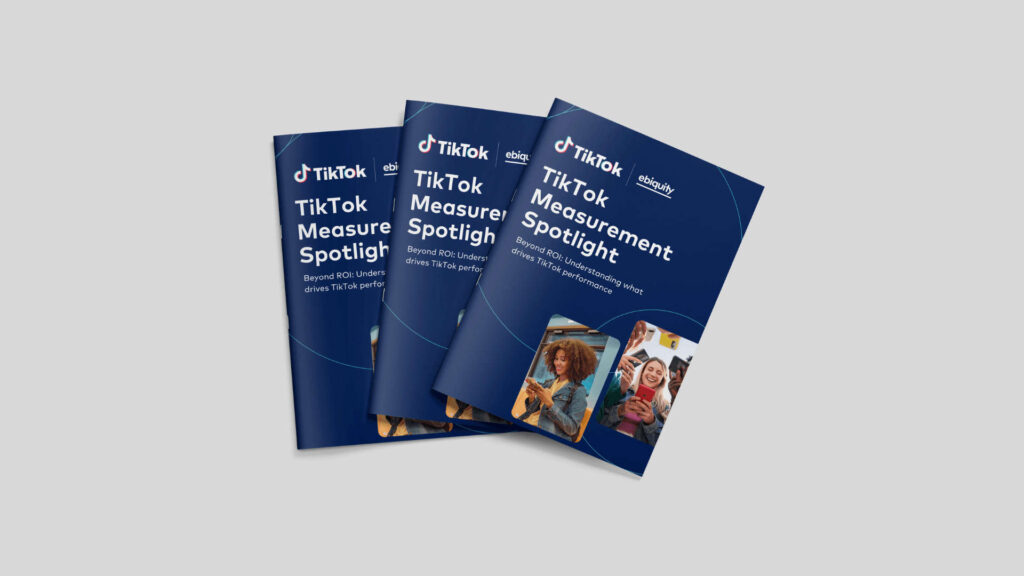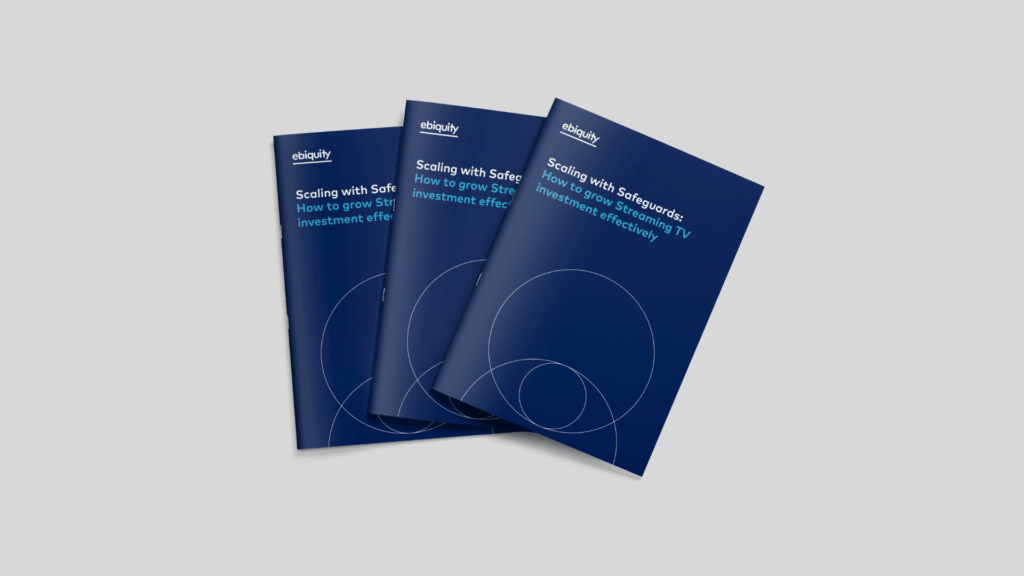One question we hear time and again from leading global advertisers is: “How can AI meaningfully improve our digital media operations?” It’s a fair question – and a timely one.
As AI moves beyond automation into more autonomous, decision-making roles, advertisers face a new challenge: how to deploy these tools in a way that enhances performance, respects regulation, and protects brand integrity. It’s not just about what AI can do, but how to ensure it does the right things – for the right reasons.
At Ebiquity, we’re increasingly working with brands to understand the implications of AI across media investment, establishing how to apply it responsibly, strategically, and with measurable impact. In this article, we unpack the critical opportunities, risks, and decisions that define AI’s role in media operations today.
The AI Disruption: Adapt or Become Obsolete?
AI is not just an evolution—it’s a revolution. The media industry, which has prided itself on adaptation and innovation, now faces a stark choice: embrace AI or get left behind. For all the talk of AI “assisting” human work, the reality is harsher. AI is rapidly replacing tasks once thought to require human intelligence, reshaping not just execution but strategy, creativity, and accountability.
For brands and agencies, this goes far beyond incremental improvement. This is a fundamental shift that must be navigated strategically to remain competitive. The question isn’t “should we use AI?” It’s “how do we maintain relevance in an AI-dominated industry?”
Immediate Opportunity: AI for Processes – Efficiency or Dehumanisation?
Repetitive tasks in media operations are disappearing under AI automation. Campaign setup, budget allocation, reporting—what once took hours now takes minutes. This means junior staff can achieve in a day what used to take years of experience to master. But is that a good thing?
- Are we replacing learning with automation? If AI eliminates ‘grunt work,’ are we building a workforce with no foundational experience?
- Are media agencies evolving fast enough to move beyond execution and become true AI integrators and advisors? When AI tools dictate strategy, what’s left for human expertise?
- What happens to critical thinking? If every process is guided by AI, do we lose the ability to challenge assumptions?
Immediate Opportunity: AI for Creative – Innovation or Homogenisation?
AI-generated creative assets are exploding in use—from ad variations to predictive persona simulations. It’s efficient, scalable, and data driven. But does it lead to great creativity, or just more of the same?
- Will AI kill creative intuition? If AI decides which ads work, how should creative teams evolve?
- Is synthetic data trustworthy? AI personas are built on algorithmic assumptions—how much can we trust them to represent real people?
- Do we risk losing creative risk-taking? If AI optimises for past success, does it eliminate the unexpected breakthroughs that define great marketing?
Responsible AI: A Non-Negotiable Imperative
AI is only as ethical as those who build and deploy it. As it takes on greater roles in media operations, ensuring responsible use is critical to maintaining trust, compliance, and fairness. Without governance, AI risks reinforcing bias, violating privacy, and prioritising efficiency over ethics.
The media industry must lead in developing AI systems that are transparent, accountable, and aligned with societal values.
That starts with fairness. AI should enhance equity and inclusivity, not undermine it through bias or opaque algorithms. It must also uphold privacy as a non-negotiable standard – protecting user data with the same rigour applied to financial or operational security. And as the environmental footprint of AI becomes more visible, sustainable deployment must be part of the conversation, not an afterthought.
- Are brands and agencies ready for AI’s ethical challenges? AI extends beyond efficiency, introducing bias, misinformation, and opacity that can erode trust. Are businesses proactively engaging ethics boards and legal teams, or merely reacting to regulations?
- Does responsible AI hinder innovation or foster trust? Some fear compliance slows progress, but in a fragile trust landscape, can brands afford to prioritise speed over responsibility? Long-term success hinges on proving AI decisions are fair, explainable, and aligned with societal values.
- How can businesses balance AI efficiency with ethics? AI depends on data, but without strong governance, it risks crossing ethical lines. Can businesses ensure privacy, fairness, and transparency, or is responsible AI just an afterthought?
Medium-Term Opportunity: AI for Business Outcomes – The End of Media KPIs?
For years, we’ve tried to link media investments directly to business outcomes. AI is now making that possible—tying ad spend to sales, distribution, and logistics data without the need for monolithic data warehouses. But this shift raises uncomfortable questions.
- Are traditional media KPIs becoming irrelevant? If AI can track business outcomes, do we still need impressions, reach, and click-through rates?
- What happens when AI finds the inefficiencies? If AI proves that 50% of your media spend is wasted, are you prepared to cut it?
- How will the role of media planners evolve? If AI models dictate strategy, does media buying become a purely algorithmic function?
The Minimum Standard: AI Literacy or AI Compliance?
It’s no longer enough to be ‘AI-aware’—leaders need deep AI literacy to navigate the new reality. AI isn’t just a tool; it’s an entity with ethical, legal, and business implications that demand urgent attention.
Actions for Leaders:
- Stop outsourcing AI decisions – If your agency is using AI, do you know how it works? If not, why are you letting someone else make decisions on your behalf?
- Challenge the AI narrative – Are your AI tools serving you, or are you
justanother data point training their models?
- Prepare for regulatory disruption – The EU AI Act isn’t a distant compliance issue—it will reshape business responsibilities overnight.
What This Means for Agencies: Survival of the Most Adaptive
The AI wave is already reshaping agencies. Those that evolve into AI-driven strategic partners will thrive. Those that cling to legacy processes will wither.
- From Media Buying to AI Engineering – Agencies must go beyond execution and become AI architects, shaping how brands leverage AI for maximum impact.
- From Performance Metrics to Outcome Metrics – Clients will demand real business impact, not just media KPIs.
- From Creative Ideation to Creative Orchestration – The role of human creatives isn’t to produce ads, but to guide and challenge AI-driven outputs.
Final Thought: Are you leading it, or being left behind?
For brands and agencies, AI is not just another tool—it is a force reshaping the fundamental nature of how media is planned, bought, and created. The brands that embrace AI strategically will gain a competitive edge, optimising spend, accelerating creative iteration, and tying media investments directly to business growth.
Agencies must redefine their value beyond execution, evolving into AI-driven consultants and strategic architects.
But here’s the challenge: AI will not pause for brands stuck in outdated processes or agencies clinging to old business models. Those who fail to take control of AI’s potential will find themselves put aside, irrelevant in a world where decisions are made faster, smarter, and more efficiently.
The real question isn’t whether AI will change media operations—it already has. The only question is: are you the architect of your AI future, or following one set by the platforms and algorithms around you? Is your agency shaping AI to serve themselves or your vision, or are you blindly adopting what the big tech firms dictate? Those who grab control of AI’s direction will win—everyone else will be left scrambling for relevance.
Leading brands partner with Ebiquity to navigate the AI frontier — not just responsibly, but with purpose, precision, and impact. Whether you’re rethinking governance, unlocking AI-driven efficiency, or aligning media with real business outcomes, we’re here to help you take control.









